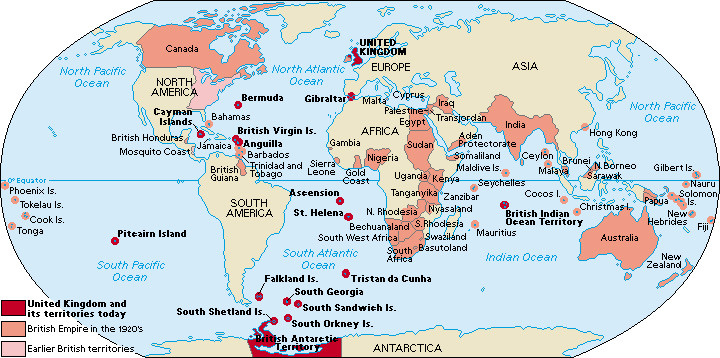British Empire describes the territories controlled by Great Britain (later the United Kingdom) from about 1500 to the late 1900’s. The British Empire had enormous influence on global culture, language, and politics. At its geographic peak in the 1920’s, the British Empire covered more than 13 million square miles (34 million square kilometers), with land on every continent. It included more than 450 million people. Most of the lands of the British Empire became independent nations in the 1900’s. Many of those nations are now members of an association called the Commonwealth of Nations.

In the 1490’s, European discovery of the “New World” of the Americas created a golden era of overseas exploration. The Spanish dominated much of the early competition to colonize new lands—particularly in South America and Central America. In the early 1500’s, England’s King Henry VIII greatly expanded the English navy (later the British Royal Navy). During the reign of his daughter, Elizabeth I, a growing number of English explorers and traders sailed to the Caribbean and other regions.
In the early 1600’s, England established successful settlements along the Atlantic coast of North America and in the Caribbean. At the same time, British colonization and influence began to grow in southern Asia.
In the 1600’s and 1700’s, Great Britain fought a series of wars with France, Spain, and the Netherlands. Rivalries over colonial power in Asia and North America contributed to the fighting. Victory in the Seven Years’ War (1756-1763) gave Great Britain control of most of eastern North America as well as former French territories in India. The British lost part of their North American territory when the American Revolution (1775-1783) created an independent United States. Victory over France in the Napoleonic Wars (1796-1815) left Britain as the world’s greatest power. The British Empire continued to expand through Africa, Asia, Australia, New Zealand, and the Pacific Islands. A century of relative European peace—known as the Pax Britannica, Latin for British Peace—ended with the onset of World War I (1914-1918).
After World War I, the United Kingdom took over some former German colonies and expanded in the Middle East as well. In 1931, the British Parliament passed the Statute of Westminster, which recognized the independence of the dominions (self-governing territories) of Australia, Canada, the Irish Free State, Newfoundland, New Zealand, and South Africa. These nations, along with the United Kingdom, became the first members of the Commonwealth of Nations.
Following World War II (1939-1945), decolonization and independence movements swept throughout the British Empire. New nations from formerly British-ruled territories soon included Burma (now Myanmar), Ceylon (now Sri Lanka), Ghana, India, Israel, Malaya (now Malaysia), Pakistan, and Sudan. In the 1960’s, nearly all the British colonies in Africa achieved independence. Many of Britain’s Caribbean colonies chose to become independent in the 1960’s through the early 1980’s. In the 1970’s and 1980’s, a number of British territories in the Pacific also became independent. The 1997 return of Hong Kong, a British possession since 1842, to China is widely considered the end of the British Empire. The United Kingdom still retains Gibraltar, the Falkland Islands, and other islands, however, as British overseas territories.
See also United Kingdom, History of the.
